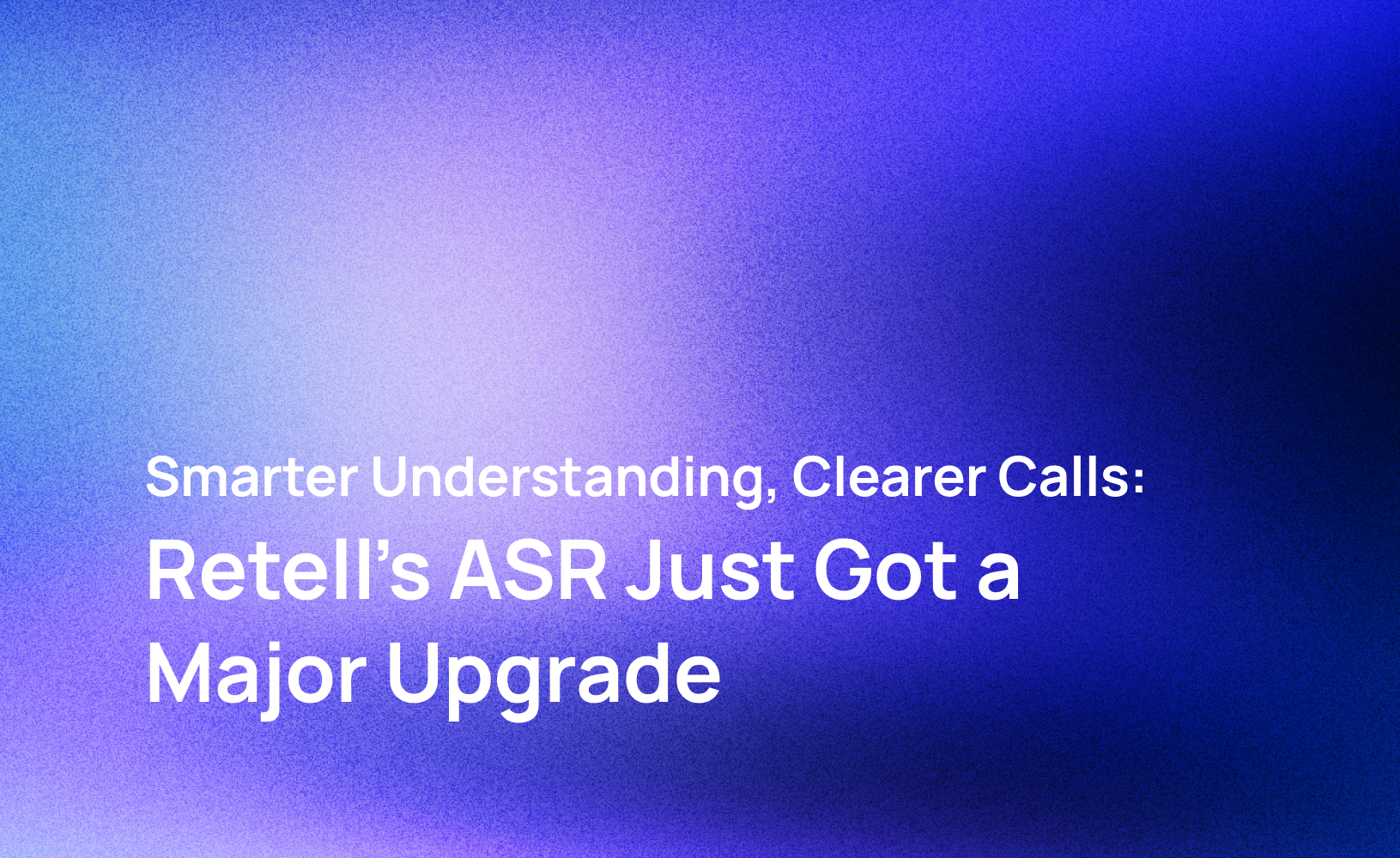AI voice agents are changing how businesses interact with customers, manage operations, and improve efficiency. According to a Gartner report, by 2025, 75% of customer service interactions will be powered by AI voice agents or chatbots.
As businesses look to innovate and drive growth, understanding the best use cases for AI voice agents is critical to staying competitive. From customer service to healthcare and e-commerce, AI voice agents are increasingly being leveraged across industries to deliver more personalized, efficient, and scalable solutions.
In this post, we’ll dive into the top use cases for AI voice agents, explore how they work, and highlight the benefits and challenges of adopting this technology for your business.
AI voice agents are intelligent systems that use artificial intelligence to interact with users through voice. These agents can understand spoken commands, respond with contextually relevant answers, and perform a variety of tasks, all through a natural voice interface. By processing speech, these systems can interpret user requests and take action, whether it's answering questions, executing commands, or making recommendations.
Businesses are integrating AI voice agents into customer service systems, e-commerce platforms, healthcare services, and more to provide scalable, on-demand support. For example, Amazon Alexa and Google Assistant are popular consumer-facing voice assistants that use advanced AI to respond to user queries. In a business context, AI voice agents are taking on more sophisticated roles, helping organizations improve efficiency and service delivery.
The functionality of AI voice agents is driven by several key technologies:
These technologies combine to create systems that can interpret voice commands, provide accurate answers, and continuously improve their responses as they interact with more users.
Integrating AI voice agents into business workflows can drive numerous advantages:
AI voice agents are being deployed across numerous industries, each benefiting from the automation and efficiency these systems bring. Let’s look at some of the best use cases:
AI voice agents are revolutionizing customer service by providing quicker, more efficient interactions.
In e-commerce, AI voice agents are enhancing the customer journey by providing personalized shopping experiences and assisting with purchasing decisions.
AI voice agents are improving the efficiency of healthcare operations while enhancing patient care.
In telemedicine, AI voice agents are improving access to care by assisting in consultations and providing basic medical advice when necessary.
AI voice agents in the financial sector are helping organizations enhance customer service while maintaining high levels of security.
The hospitality and travel industries are using AI voice agents to streamline operations and improve the customer experience.
Retell AI, a leader in AI voice technology, provides businesses with powerful solutions for automating voice interactions. Below are some specific use cases of Retell AI that are driving innovation across various industries:
Despite the numerous benefits AI voice agents offer, there are several challenges that businesses must consider before fully integrating them into their operations. These challenges range from privacy concerns to technological limitations. Understanding these barriers will help businesses make informed decisions and implement AI voice agents in a way that maximizes their potential while minimizing risk.
One of the most significant challenges surrounding AI voice agents is privacy. Since these systems rely on collecting, processing, and storing voice data to function, there is a heightened risk of exposing sensitive information. Voice interactions often contain personally identifiable information (PII), such as customer names, addresses, account numbers, and even financial details. If not properly managed, this data could be vulnerable to breaches or unauthorized access.
In industries like healthcare, privacy concerns take on an even more critical role due to regulations like HIPAA (Health Insurance Portability and Accountability Act). HIPAA mandates stringent rules for the protection of patient health information (PHI), and violations can lead to severe penalties and reputational harm. Healthcare organizations that use AI voice agents must ensure these systems are compliant with HIPAA regulations, especially when processing sensitive patient data.
To mitigate these risks, businesses must ensure compliance with privacy regulations like:
To ensure compliance with these regulations, businesses must implement:
Failure to comply with these privacy regulations can lead to severe financial penalties and reputational damage. Furthermore, customers who feel their data is not adequately protected may lose trust in your business, making them less likely to engage with AI voice agents in the future.
While AI voice agents have come a long way in terms of functionality and reliability, there are still several technological limitations that can affect their effectiveness. Businesses need to understand these limitations and set realistic expectations for both employees and customers.
AI voice agents are adept at handling simple, straightforward queries. However, they often struggle with complex or multi-step instructions that require deeper understanding or contextual awareness.
For example, if a customer asks, "Can I change my flight to next Tuesday, and also, how do I add extra luggage?", the AI agent may only be able to address one part of the query at a time. This lack of sophistication in understanding multi-part or compound queries can result in incomplete or frustrating customer experiences.
Additionally, AI voice agents may not fully grasp nuanced language, including sarcasm, idioms, or emotional tone. If a customer says, "That was a disaster!" after a poor experience, the agent may not recognize the emotional sentiment and could provide a generic, irrelevant response. This makes it difficult for voice agents to handle complicated customer service situations that require empathy or intricate problem-solving.
Another significant limitation of AI voice agents is their ability to accurately interpret accents and dialects, especially in global markets where speech patterns can vary widely. While many voice agents have been trained to understand popular accents, they may still struggle with regional dialects, slang, or uncommon pronunciations.
For example, an AI agent in the UK might have difficulty understanding American English, or an agent in the U.S. may have trouble with certain British accents.
This issue becomes particularly problematic in international or multicultural settings, where businesses need to cater to a diverse customer base. Voice agents that cannot accurately recognize different speech patterns could lead to misunderstandings, customer frustration, and an overall decrease in user satisfaction. It's important to note that while the technology is improving, it is still far from perfect in this regard.
AI voice agents are highly efficient at responding to clear and direct queries. However, when faced with ambiguous or vague requests, they often struggle to determine the intent behind the question.
For example, if a customer says, "I want to change my order," the AI might not immediately understand what "change" refers to—whether it's modifying the shipping address, adding more items, or changing the product entirely. In such cases, AI voice agents may either fail to respond or provide an answer that misses the mark, which can lead to a frustrating experience for the customer.
Additionally, because AI voice agents rely on structured, predefined commands or patterns to understand requests, they can be easily "tricked" by unclear or incomplete sentences. This lack of adaptability to natural, conversational language often results in users needing to repeat themselves or provide more information, disrupting the flow of the interaction.
Many AI voice agents are designed to handle one query at a time. This becomes a limitation when users want to engage in more complex tasks that involve multiple steps or require the voice agent to juggle multiple requests simultaneously.
For instance, if a customer asks a voice agent to check their order status while also requesting information about product recommendations, the AI may only be able to focus on one task at a time, causing delays or errors in its response.
As a result, businesses that rely on AI voice agents to streamline workflows may face limitations in automating more complex business processes, such as order fulfillment, customer support, and troubleshooting.
AI voice agents are transforming industries, enhancing customer service, and streamlining operations. However, businesses must remain mindful of the challenges—especially privacy concerns and technological limitations. By understanding these barriers and addressing them proactively, companies can fully capitalize on the immense benefits AI voice agents offer.
In sectors like healthcare, compliance with privacy regulations such as HIPAA is crucial to ensure patient data is protected. Whether you're aiming to enhance customer experiences, boost efficiency, or reduce operational costs, AI voice agents can drive your business forward.
Retell AI is a solution that empowers businesses to seamlessly integrate AI voice agents into their workflows. With advanced capabilities in customer service, e-commerce, healthcare, and more, Retell AI provides cutting-edge technology tailored to your specific needs. Get a free demo today!
See how much your business could save by switching to AI-powered voice agents.
Total Human Agent Cost
AI Agent Cost
Estimated Savings
A Demo Phone Number From Retell Clinic Office
Revolutionize your call operation with Retell.
.jpeg)


